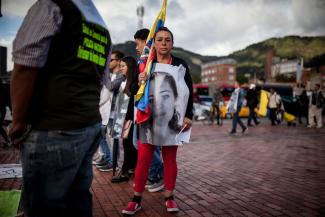Civil strife
Fragile peace

In 2016, Duque’s predecessor Juan Manuel Santos concluded peace agreements with the leftist FARC-EP militia. The peace accords include provisions relating to:
- human rights,
- the protection of community leaders,
- the demobilisation of combatants,
- justice and reconciliation,
- rural reform,
- the reduction of poverty and inequality in rural areas,
- political participation of all parties involved in decades of civil war and
- illicit crops (in particular coca).
Not quite a quarter of provisions have been fully implemented to date, according to a recent assessment by researchers from Notre Dame University in the USA. It is worrisome that the implementation has been slowing down. The double reason is that the Duque government lacks both the capacities and the political will for effective implementation.
Indeed, Duque agitated against the peace agreements during the election campaign. Moreover, he is a right-wing politician whose vision of development is basically industrialisation. By contrast, the peace agreements focused on a local-level, pro-peasant approach. In any case, it is a core challenge that Colombia’s state has never had a meaningful presence in remote rural areas. Any government would struggle to introduce change there.
The Duque administration has further weakened state capacities in rural areas by reducing funding for relevant institutions such as the National Land Agency, the Territorial Renovation Agency and the Rural Development Agency. It prefers to spend money on boosting industrialisation in urban areas.
The peace agreements foresaw that peasants would voluntarily stop the cultivation of illicit crops, but the Duque administration is in favour of a more repressive approach (see my essay in Tribune section of D+C/E+Z e-paper 2019/03). It has also tried to veto or block legislation related to the implementation of transitional justice measures, including the truth commission. While the government still speaks of “demobilisation” and “reintegration”, it generally avoids terms such as “peace accords”, “justice” and “reconciliation”. The implication is that the FARC-EP is not an equal partner in peace building, but a criminal gang that has lost.
Duque’s position is awkward. On the one hand, he depends on a coalition of right-wing forces that either did not support the peace accords or even actively opposed them. On the other hand, he is bound by the law and the agreements his predecessor signed. He cannot by simple decree undo the work Santos did, but he wants to please his base ahead of local elections in October.
Accordingly, the peace is becoming ever more fragile. Since Duque took office, different armed organisations have killed at least 229 community leaders and human-rights activists. Almost a third of them were indigenous activists. All of them were, in one way or another, demanding that the peace agreements be fully implemented. They were thus challenging powerful vested interests at the local level.
A small number of prominent FARC-EP members have gone into hiding. In early September, they released a call to arms. They were meant to participate in the truth commission and other mechanisms of transitional justice. That they have once again opted for a clandestine life provides political capital to the peace agreement’s right-wing opponents that argue this proves the failure of the peace process. It also creates a sense of fear for the peace process and unaccountability for victims. However, most of demobilised guerrillas are complying with the agreements and have rejected the decision of former FARC-EP members to renounce to the peace process.
The forthcoming local elections are very important. They will either consolidate or weaken the power of the government. Armed opponents of the agreements are aware of this fact, and they seem to be stepping up their violent action now. On the other hand, civil-society organisations are campaigning in favour of the peace agreements. The accords are not dead. For Colombians to live in peace, they must be implemented.
Fabio Andrés Díaz Pabón is a research associate at Rhodes University in South Africa and a researcher at the International Institute of Social Studies in The Hague.
diazpabon@iss.nl







